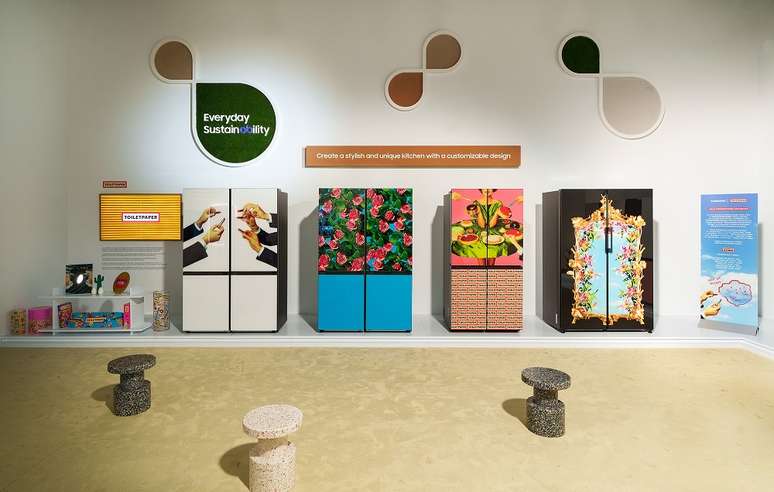Check out the exclusive interview with Seonju Lee, Head of Kitchen Design Group, Digital Home Appliance Business at Samsung
On June 7, Samsung held the event the event Tailored life 2023, in which he presented launches, new technologies and new sustainable actions. Casa.com.br spoke exclusively with Seonju Lee, Head of Kitchen Design Group, Digital Appliance Business, responsible for all areas of kitchen design such as refrigerators, stoves, ovens, dishwashers and range hoods at Samsung Appliances on brand news. Watch:
Given the new post-pandemic scenarios (new needs of homes and new lifestyles) what can we expect from now on from household appliances?
After the pandemic, consumer expectations for home appliances have changed due to the growing interest in sustainable, connected and smart solutions. At the same time, the demand for customization in terms of functionality and design is stronger than ever. It is clear that today’s consumers want appliances that reflect their design tastes, suit their usage patterns and can help them actively reduce their energy consumption.
The Bespoke design philosophy fully embraces these trends and continues to evolve to meet the changing needs of consumers. What started out as a way for people to inject their own personality into their homes by personalizing the flowers, materials and finishes of its home appliances, has expanded into a new product line that includes clothing, flooring and air care. Today, our Bespoke range offers affordable, functional and stylish solutions that cater to consumer tastes throughout the home.
See MyBespoke as an example. Launched last year, it offers consumers greater flexibility by allowing them to create custom designs with customized panels and modules to meet their specific needs. Additionally, with options including Top-Mounted Freezer, Bottom-Mounted Freezer and Side-By-Side models, Samsung continues to expand its line of refrigerators to offer consumers more options to fit their lifestyle, routine and to the interior of the kitchen.
Increasingly, however, consumers are looking beyond aesthetics and considering how to personalize their lifestyle through connectivity and sustainability. We continue to improve SmartThings Energy’s AI energy mode to maximize users’ energy savings and make the entire range of refrigerators Wi-Fi connected for years to come. At the same time, we continue to promote sustainability by expanding our use of recycled plastics in our product manufacturing process and with environmentally friendly packaging.
Advances like these highlight the direction we believe home appliances are heading in. It is clear that the appliances of the future will need to be able to offer a completely personalized experience and we will continue to improve the Bespoke range to offer just that.
As head of the Kitchen Design Group, what is Samsung’s ideal kitchen? Could you share what is the desired user experience from the brand?
I think a kitchen that supplies a high experience for the lifestyle change of each user it is the ideal kitchen. Thus, Bespoke design started from the idea that the mere appearance of a product is not everything. Starting from understanding the people who use our products and the space they inhabit, we focus on creating a design concept that can contain the integrated experience of “people, products and space”.
As a result, we were able to demonstrate how the Bespoke concept can express different preferences and tastes, without compromising functionality or design. For example, some customers love the way our Bespoke appliances can blend seamlessly into any setting, while others prefer their appliances to boldly stand out.
It is this limitless possibility that strongly appeals to design-conscious users and can evolve as lifestyles change. In addition to the aesthetic elements, the connectivity of our appliances allows our users to customize their kitchen activities, such as preheating an oven or turning on the dishwasher, according to their schedules or routines.
The purpose of our approach to kitchen design is to provide more advanced user experiences by continuing to expand our portfolio of customizable and connected products to consider how an appliance is used and the environment around it.
html[data-range=”xlarge”] figure image img.img-b37f89f38709958f8fa4fdb6bed88afbi18th8t3 { width: 774px; height: 492px; }HTML[data-range=”large”] figure image img.img-b37f89f38709958f8fa4fdb6bed88afbi18th8t3 { width: 548px; height: 349px; }HTML[data-range=”small”] figure image img.img-b37f89f38709958f8fa4fdb6bed88afbi18th8t3, html[data-range=”medium”] figure image img.img-b37f89f38709958f8fa4fdb6bed88afbi18th8t3 { width: 564px; height: 359px; }
We know that Samsung makes different products for different markets (we tested the RT46 refrigerator, intended for consumers in Brazil). Is there anything new that the Brazilian consumer can expect?
Bespoke, which had a major impact on appliance trends in the Korean market, is now showing signs of a more global influence. In one sense, appliances are an attractive category as there is more variety in how customers use their appliances depending on regional characteristics.
This encourages us to develop specialized approaches tailored to different markets, such as Europe, North America, South America and Southeast Asia, etc. with regional experts and local studios to develop designs optimized for local preferences. This way, we can truly capture the evolving needs of our customers across regions.
Models that will hit the Brazilian market in 2023 include two refrigerator options: French Door (FDR) equipped with Family Hub™ and Side-By-Side (SBS) Bespoke. By continuously launching new models of home appliances, we aim to meet the unique needs of consumers and offer more options to express yourself through your interior with our designs and functions.
Taking into account Samsung’s commitment to sustainability, will new practices be introduced? And as for the products themselves, are there any new technologies that will be introduced?
As we strive to enable consumers to practice sustainability every day, we not only identify ways to reduce waste and energy use; we also continue to promote responsible practices throughout the product lifecycle, from sourcing and manufacturing to distribution, use and recycling. This eco-conscious production chain prioritizes the incorporation of recycled materials and allows consumers to use their products for longer thanks to services such as our 20-year guarantee on components.
Not only do we operate a closed-loop recycling process at our in-house recycling centre, but we also incorporate bioplastic materials made from waste oil into the storage bins of our custom built fridges. We’ve also expanded the use of recycled plastic from fishing nets into products ranging from smartphones to vacuum cleaners, and our eco-packaging has been improved to use less colored ink, staples, plastic tape and spools, and to incorporate more recycled paper .
By analyzing consumer usage patterns and adjusting settings to save energy, SmartThings Energy’s AI energy mode plays a key role in making sustainability easier for everyone. This year, five new Bespoke devices will feature an updated AI energy mode, which will soon be available in 65 countries. We’ve also begun providing a software update for many of our older models to help more users save more energy at home.
Source: Terra
Ben Stock is a lifestyle journalist and author at Gossipify. He writes about topics such as health, wellness, travel, food and home decor. He provides practical advice and inspiration to improve well-being, keeps readers up to date with latest lifestyle news and trends, known for his engaging writing style, in-depth analysis and unique perspectives.








